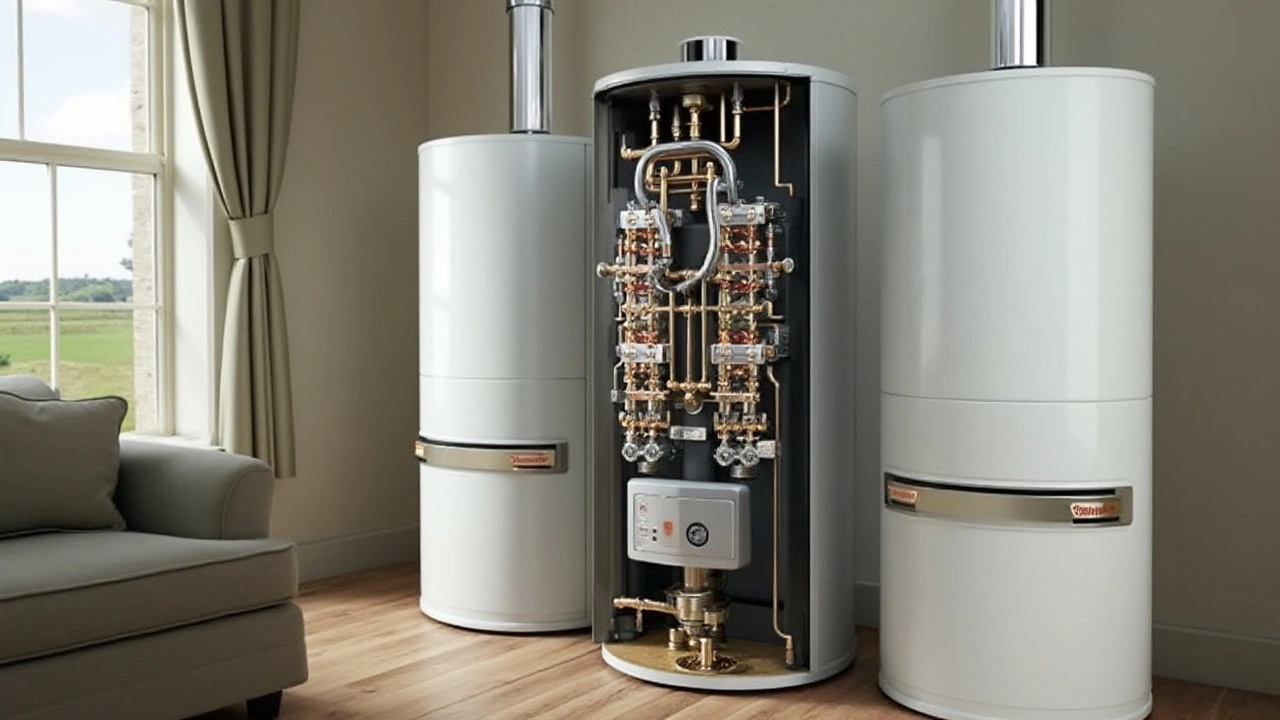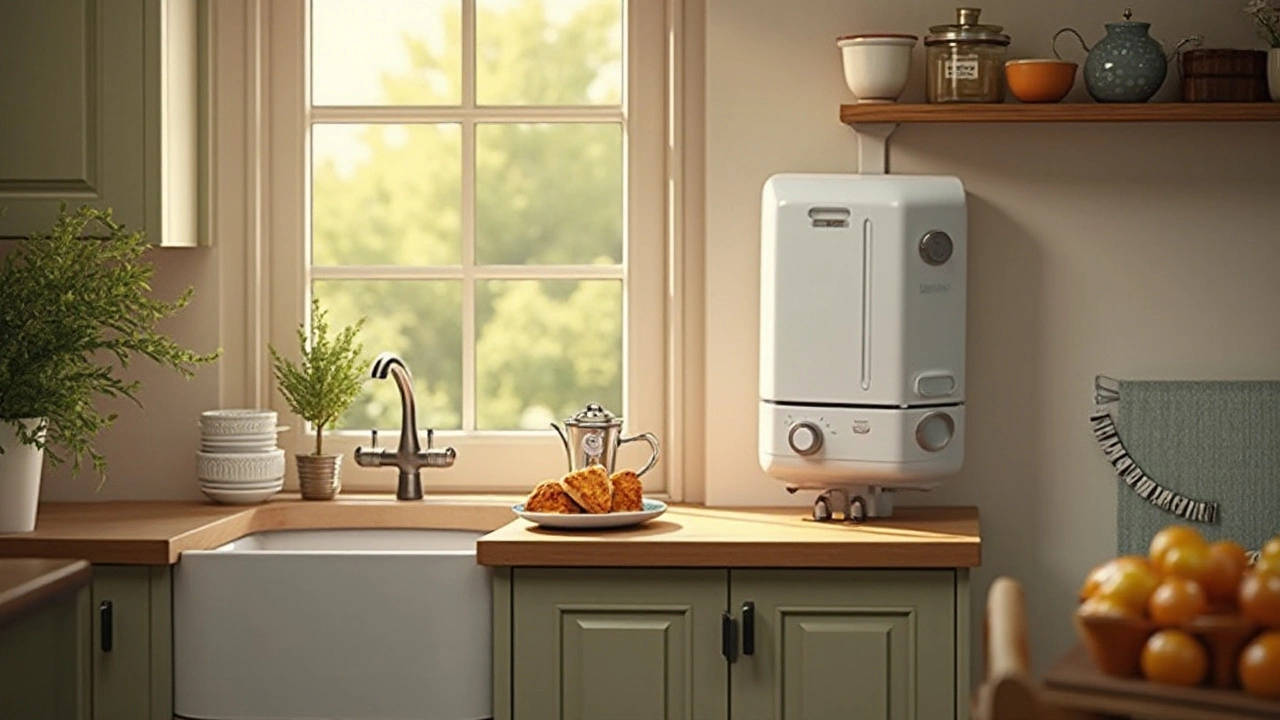Water heaters form a crucial part of our everyday life, from warming up your morning shower to making sure your dishes are spotless. Knowing how long these hardworking appliances usually last can offer peace of mind and assist in future planning. While each model might vary, there are general signs and maintenance routines that can help extend a heater's life.
In this article, we'll dive into what you can expect from your trusty water heater. We'll explore the common aspects that affect its durability and share some pointers for regular care. This knowledge can be invaluable, ensuring that you aren’t caught off-guard with a cold surprise one chilly morning. Whether yours is a young unit or one that's been working for years, being informed is key to maximizing its lifespan and efficiency.
- Understanding Water Heater Lifespan
- Common Factors Affecting Longevity
- Signs Your Water Heater Needs Attention
- Maintenance Tips for Prolonged Use
Understanding Water Heater Lifespan
When it comes to modern conveniences, water heaters often go unnoticed under the sink or hidden away in a basement corner, quietly doing their job day in and day out. They keep our baths warm, our dishes clean, and many times, they're just one of those things we don't think about until they act up or, worst, break down completely. So, how long should you expect this unsung hero to last? Typically, a standard tank-style water heater should last between 8 to 12 years. The lifespan largely depends on factors such as the type of heater, the quality of water in your area, and how well it's been maintained over the years.
Different models and types of water heaters have varied lifespans. Tankless water heaters, often heralded for their energy efficiency, can last even longer, up to 20 years in some cases. Indeed, the choice of a water heater might shift as discussions about energy efficiency become more common. The availability of newer technologies and materials in manufacturing plays a crucial role. However, even if your heater is of the highest quality, hard water with high mineral content can contribute significantly to wear and tear, leading to a quicker decline. Regular maintenance, such as flushing the tank to remove sediment build-up, becomes essential for increasing lifespan.
A case in point, a study by the U.S. Department of Energy highlights that well-maintained heaters consume 10-15% less energy, emphasizing the importance of maintenance practices. Throughout the years, technological advancements have paved the way for various options like solar-powered models and hybrids. In one of their reports, Energy Star noted,
'Selecting a high efficiency water heater model can save a household an average of $300 in energy bills each year.'Indeed, while the initial investment might seem daunting, the returns over a decade or two can be quite convincing.
Keeping an eye on potential lifespan doesn’t just relieve the anxiety of sudden breakdowns. Taking preemptive care saves money in the long term by minimizing unforeseen repairs or replacements. Having an idea about the average life expectancy and understanding the factors affecting it ensures that homeowners like us in Auckland, where temperatures can vary, aren’t caught by surprise. After all, as devices that are quite literally hidden in the shadows, water heaters deserve their due attention for seamless daily comfort. It's a step that promises peace of mind and ensures warm showers on cool mornings for years to come.

Common Factors Affecting Longevity
A water heater's lifespan doesn't just rely on the passage of time. Instead, it is the culmination of various influencing factors, many of which homeowners might not consider on a daily basis. Understanding these elements is key to ensuring your water heater lifespan lasts as long as possible. One primary factor is the type of water heater in use, as conventional tank water heaters usually last between 8 to 12 years, while tankless models often last over 20 years. This distinct difference showcases the technological advancements that can enhance durability.
Another significant factor is the quality of installation and the consistency of water heater maintenance. A properly installed heater by a skilled technician can mean the difference between a well-functioning unit and one riddled with issues from the start. Coupled with routine maintenance, where sediments are flushed out and elements are checked, could dramatically enhance performance. For instance, annual draining of water heaters can prevent mineral buildup, a common culprit in reducing efficiency and longevity.
The water quality flowing through your system plays a substantial role as well. Areas with hard water, characterized by high mineral content, can expedite the wear and tear on your unit. These minerals can accumulate inside the tank, insulating the heating elements and making the heater work harder, which can lead to premature failure. Utilizing a water softener may mitigate these effects by reducing mineral deposits, thus promoting heater longevity.
While environmental conditions, such as climate and location, might not be as controllable, their impacts should be recognized. Heaters installed in unheated spaces can suffer due to exposure to cold temperatures, leading to reduced efficiency. Offering protection through insulation jackets or housing the unit in a more controlled environment can alleviate unnecessary strain on the system. Similarly, frequent usage or misalignment with a home's hot water demands can stress a heater beyond its capacity, increasing the likelihood of breakdowns.
According to the U.S. Department of Energy, simply lowering the thermostat setting on your water heater can reduce wear, extend its life, and slash energy usage by 4-22% annually. It's a small adjustment with a significant impact.These multidimensional aspects, when given attention, not only prolong the life of your heater but also optimize its efficiency, ensuring you get the most out of your investment. In a spirited pursuit of long-term service, addressing factors such as installation quality, water hardness, routine maintenance, and operational environment can be the game-changers every homeowner needs.

Signs Your Water Heater Needs Attention
Water heaters, like any other home appliance, show signs when they're not functioning as they should. Spotting these signs early can save you from waking up to an unexpected cold shower. One of the most common indicators that your water heater needs work is a change in water temperature. If you notice that the hot water doesn't last as long as it used to or takes longer to heat up, your system may be struggling. This can signal an issue with the heating element or thermostat, both of which are critical to the heater’s operation. It's essential to pay attention to these changes, as they can prevent further damage.
Strange noises emanating from the water heater are another sign that you might need to call in a repair technician. These sounds, often described as popping or rumbling, typically originate from sediment build-up at the bottom of the tank. Over time, this sediment hardens and forces the heater to work harder, potentially leading to a shorter lifespan. Regular maintenance, including flushing the tank, can resolve this issue.
According to the U.S. Department of Energy, "periodic maintenance will prolong the life of your water heater and keep it as efficient as possible."
A potential leak is one of the most serious indicators that your water heater lifespan might be nearing its end. Visible water pooling around the base of the heater or damp spots on the floor can be concerning signs. Even small leaks can escalate quickly, so it's crucial to address them immediately to prevent water damage to your home. Corrosion and rust around the tank or pipes can also indicate a leakage issue that needs urgent attention. Always remember, when it comes to water heaters, a proactive approach is far better than waiting until it's too late.
In some instances, discolored water flowing out of your taps can hint at problems under the hood. Rusty or muddy water can result from corrosion inside the tank, suggesting potential deterioration. It’s not just a matter of aesthetics but a possible health concern too. It might be time to consider replacing the anode rod or, depending on the heater's age, preparing for replacement. A well-maintained water heater shouldn’t distribute anything but clean water, making this sign critical to act upon promptly.
A sharp increase in your energy bill without a corresponding rise in usage might have the water heater as a culprit. An inefficient unit often uses more power or gas to heat the same amount of water. Factors like sediment build-up or age naturally reduce efficiency, causing utility bills to spike. Investing in a new water heater or scheduling comprehensive maintenance could restore optimum performance, ensuring you aren’t uncomfortably surprised by your monthly bills.
Unexpected issues are never pleasant, especially when it affects your daily life. Keeping an eye on these warning signals guarantees your water heater remains a reliable fixture in your home. Routine checks and listening to what your home appliances are telling you go a long way in maintaining a smooth-running household.

Maintenance Tips for Prolonged Use
Keeping your water heater in top shape can be a bit like nurturing a relationship; it takes regular attention and care to enjoy its benefits for the long haul. Just like a friend who thrives with consistent, gentle encouragement, your water heater will perform best with planned maintenance. One of the simplest ways to extend its lifespan is to regularly check and adjust the thermostat. Over time, settings can accidentally change, leading to inefficiencies or overly hot water, which can result in unnecessary wear. Keeping the water temperature around 120 degrees Fahrenheit not only prevents accidental scalding but also reduces mineral buildup inside the tank.
Another important step is to flush your water heater tank once a year. This act of giving it a deep clean helps remove sediment and mineral deposits that can accumulate from hard water. These particles can cause your unit to become noisy, inefficient, and ultimately decrease its longevity. Enlist the help of a professional if you're not sure how to proceed, as they can ensure the process is done correctly. Regularly inspecting your water heater for leaks or drips can prevent small issues from becoming larger, more costly problems. If you do spot trouble, tackling it immediately can save you headaches and expense.
If your water heater is of the tank variety, consider this wise nugget of advice: wrap it in an insulating blanket. This simple, often overlooked measure can dramatically conserve heat, reducing energy expenditure by as much as 10-15%. While most modern models come pre-insulated, older units fail at efficiency without that added thermal cushioning. It keeps the heat in, lessening the burden on your unit to keep water consistently warm.
As noted by a respected industry professional, "Taking time for routine checks and part replacements not only extends the life of your water heater but also keeps your energy bill in check."
"Routine care rituals ensure your appliance rewards you with reliability and efficiency day after day," advises John Carter, an experienced technician with over two decades in the field.Water heater maintenance isn’t just about what your unit is—it’s also about where it is. Be mindful of its placement, ensuring it has enough space for air flow. Crowding it with clutter or jamming it into tight spaces without room to breathe can drastically affect its performance and life expectancy.
If you have a tankless water heater, cleaning the air intake filter regularly is paramount for efficiency. This simple step ensures your unit is drawing in clean air, free of debris and dust that could otherwise clog the system. Also, descaling is equally crucial for a tankless model, aiming to eliminate any mineral buildup within the heating elements. Many manufacturers recommend doing so anywhere from once a year to every six months, especially in areas with particularly hard water.
By consistently heeding these tips, you'll be embracing a commonsense approach to extending the lifespan of your water heater. It's not just about avoiding emergencies but about achieving sustained performance and peace of mind in your home. By investing a little effort and time, you ensure that your water heater rewards you with warmth and reliability for many years.


